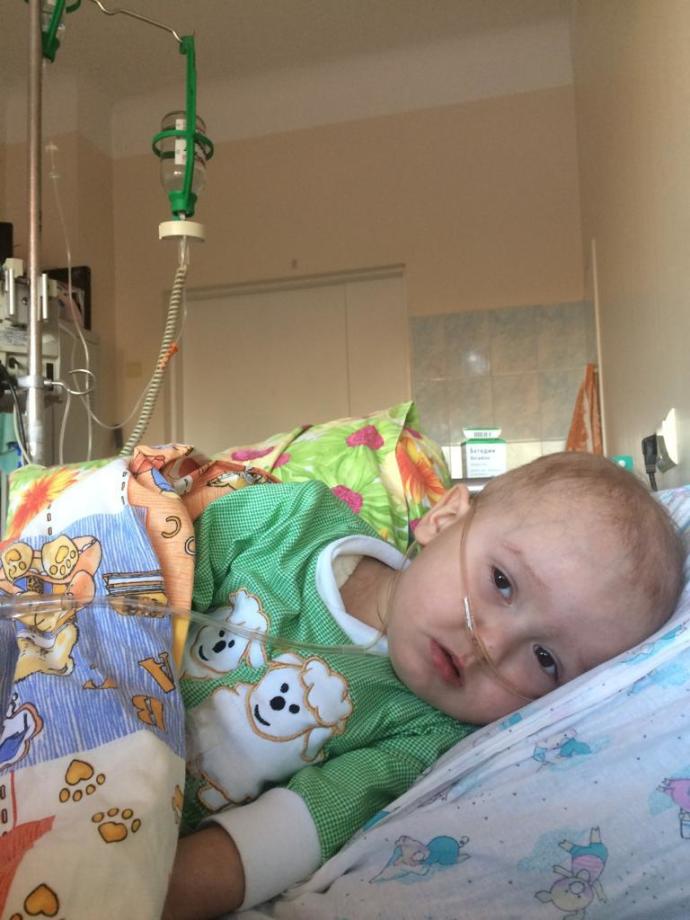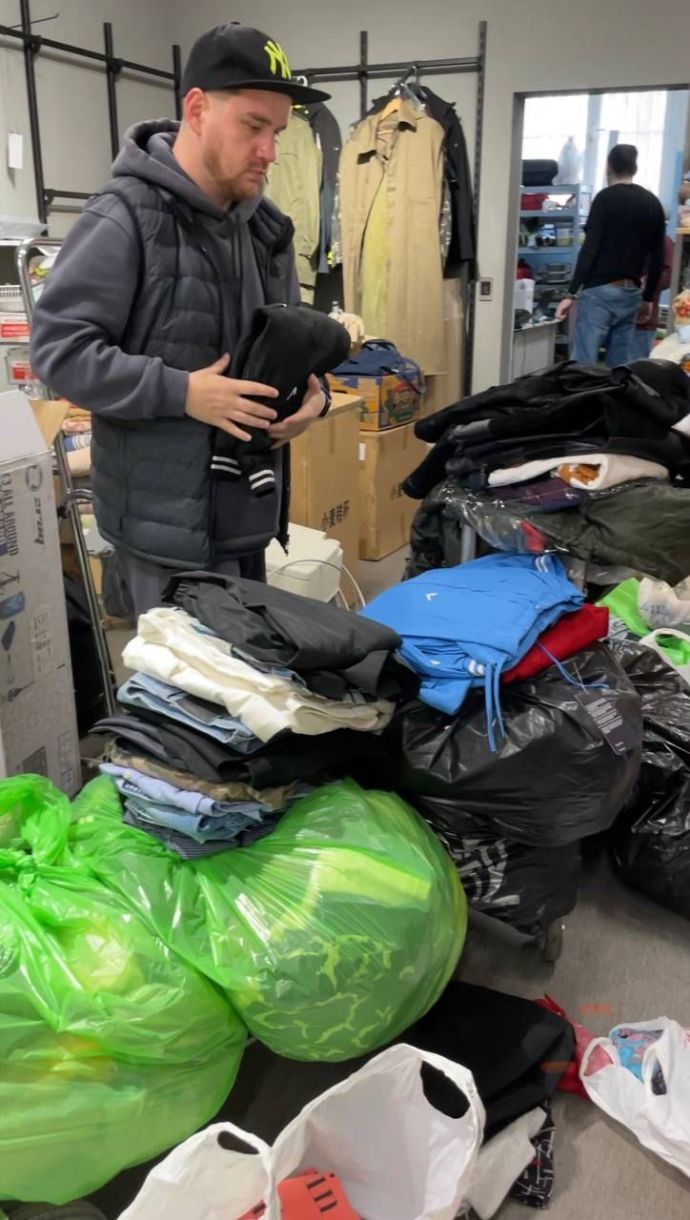"I keep telling our volunteers that we are now in 'people business,' working for and with people and helping each other. It is a humanitarian issue, and we need all the help we can get," said Edward Kliefer, a Ukrainian-born Israeli who founded the Global Association for Humanitarian Aid to Ukraine, which is assisting Ukrainian residents who remained in the country after the Russian invasion.
The organization helps residents of the war-torn country who have lost their homes and need shelter, food and clothing. They help the elderly, women, and orphans and even contact and work with local hospitals, including those specializing in treating cancer patients who desperately need medication and medical equipment.
"When the war started, I started my journey together with friends to get out of the battlefield and cross the border," says Kliefer, who in recent years returned to work in Ukraine, where he operated a medical clinic and engaged in outpatient surgery, "We spent a long time on the road, and at night when we stopped to rest at a hotel, one of my friends asked me to come back and transfer his ex-wife across the border. I can move freely because I have an Israeli passport and work permits.

"I drove back, and on the way, I picked up more people, including families with babies, who have difficulty traveling on foot," he recalls. "That's how I got drawn into an entire group of volunteers, which worked all week. Every day I drove back and forth, bringing people and helping them cross the border, until I told myself that I could, and should do more."
At this point, Edward decided to form the organization, whose goal is to help those left behind. He traveled to Austria, which is known as a country that closely monitors aid organizations and works with many bodies around the world that work in the field. "I saw the growing humanitarian problem within the country due to the war," Edward explains, "I told myself I could raise funds to pay for buses to get people out of the war zones and provide them with temporary shelter and medicine.
"I contacted local officials, and I realized that there was a serious problem. A great deal of the aid money is directed to those who have left the country, but there is almost no assistance for those left behind. I arranged contracts with volunteers, and we established local humanitarian aid headquarters in Odessa and Kyiv.
"At the same time, I also contacted local hospitals that treat cancer patients, and I learned that there are not enough supplies for medicines and medical products. Our goal is to help them assist the local population. We need to raise money for food, strengthen our volunteer organization, and pay for vehicles to transport citizens across the border. Bear in mind that there are many organizations that help refugees, and the Jewish Agency and other elements from Israel assist refugees and the Jewish population – but we want to help those who are left behind, who cannot leave."
Two different worlds
"When you cross the border, it's two different worlds," Edward points out. "It's not just in the bombed areas, where you're constantly in physical danger. Even those in an area considered relatively quiet – although there are not many today – are still in fear, and their thoughts are constantly preoccupied with the war around them. Everything is immersed in war and victory. When you cross the border, you see people living normal lives, going to cafes, the opera, going to clubs and traveling. Everyone knows there is war across the border, but it is in parallel worlds, and in one of the worlds, there is murder and terrible suffering. We still do not know how the war will end or how long it will last. At the moment, every cease-fire is just a preparation for the next battle."
They feel that they are not alone
Edward has set up a website for the association at aidtoukraine.at, where people can contribute and learn more about the organization's goals and its work with different groups. "Every week, we hear of more areas being attacked or under siege," he says, describing the harsh reality in the country. "I took all my staff out of the country, but there are people who are stayed behind because it is their responsibility to take care of the people. Hospital department heads, doctors and nurses remained to help. Only women and children are allowed to leave the country, and we are doing what we can for them and trying to find a place to sleep for those who leave the country, so that they do not have to go to the stadiums or halls where the refugees are temporarily housed."
Edward talks about the difficult feelings that have accompanied the people of Ukraine in recent months, who hear about the sanctions that the West has imposed on Russia and the military assistance provided to the Ukrainian army, but they would like much more. "They feel there is aid, but it's mostly for military purposes," he said. "There is a sense that Europe has not yet realized that this is a repeat of Hitler's annexation in 1938. I also think that the President of Ukraine, Vladimir Zelensky, who is Jewish, as are half of the members of his government and cabinet, has done a tremendous job unifying the people and appealing to the West. It is reminiscent of Israel during its wars. The citizens understand that there is outside help and, despite the claims, understand that they are not alone, and that support is arriving in the form of money and ammunition. It's an army with a strong spirit and extensive knowledge that has succeeded for the time being in stopping the second most powerful army in the world. They're confident they can win with that spirit. The question is when."
Edward, a native of Ukraine, made aliyah to Israel at the age of 15 and served in the IDF and the reserves. A decade ago, he returned to his homeland to work, and today he is simply unable to stand aside. "We want to alleviate people's suffering, and we must not bury our heads in the sand," he says. "This war is like World War II. The weapons are new, but it is the same war in terms of losses and suffering, and it must stop, and we must help those left behind."

A matter of life and death
Ella Rashkovitz, who runs the hospital for children with cancer in the Kyiv district, urgently needs ongoing assistance with regard to medicines and medical equipment while struggling with her dedicated staff to help sick children and families who still need life-saving care and cannot be relocated. "We have 310 places in the hospital, and we perform close to 5,000 cancer-related surgeries annually, and we serve all ages, from children to adults," she says.
Rashkovitz says the Kyiv region suffers from a high percentage of children suffering from cancer due to the explosion at the Chernobyl nuclear power plant in 1986, located outside the capital. "Because many areas of the country were affected by the attacks of the Russian army in the war, they made collection points to evacuate the children with cancer from those areas to Kyiv," she says. "These are children who can not be evacuated to European countries."
Rashkovitz says that despite the shelling that Kyiv has experienced, the team has continued to work, despite the difficulties. "We can not stop treating people, certainly not children. It is a matter of life or death," she emphasizes. We provide chemotherapy, radiotherapy and more, not only for residents of the area but for many who are referred to us from different parts of the country. There is a significant shortage of medicines and substances for chemotherapy treatments and operating rooms. We adapt and examine who can be saved and who has only a few days or weeks left to live.
"At the time of the bombing of Kyiv, we were in shelters," she recalls. "We take the patients who can be moved to a protected area when there are attacks, and when there is calm, we go back up and open the operating rooms. All the budgets and aid go to the war efforts, and we have to rely on humanitarian assistance for medicine. Unfortunately, the disease does not choose a time or place to harm patients. My team realized that they could save their own lives if they closed the hospital and escaped, but that would cause harm to the patients, so we decided to stay.
"I want to reach out to anyone who cares about Ukraine, especially children. The hospital is working to save lives. I am asking for help with medicines and equipment so that we can bring more patients from other areas, especially children, because the condition of cancer patients without treatment can deteriorate rapidly."
It is impossible to remain neutral
Smirnov Vyacheslav works in IT and is from the Kyiv region. Before the war, he worked with medical staff and pharmacies, and now races through Ukraine with his wife to help as many people as possible. "When the war started, I was left without a job," he says. "When the shelling began, we were at home. After three days in Kyiv, we left for Odessa, and when we were on the road, we saw people in need. We wanted to help and purchased food and clothes for them, and from here, our new job began, to help everyone we could locate.
"We started looking for people who needed help," Vyacheslav adds. "I contacted friends in Israel and Europe and tried to raise as much money, clothing and food as possible. The stories we are hearing are very difficult, like a woman returning alone from Mariupol who lost her son, who was killed, and she herself was left homeless, with no friends.
"When we were in the hospital in Kyiv, we saw difficult sights – people returning from the fighting missing an arm or a leg, many shrapnel injuries, and the hospital did not have enough medicine. Edward started helping us, and that's how the connection was made. We have many expenses for fuel, clothes, food and medicine – basic things that everyone has in their own country and we do not have. The country is incapacitated – there are orphaned children, we do not even have baby food or diapers, everything that was in stores has long since run out, and we are searching for these things outside the country.
"There was a huge disaster here," Vyacheslav declares. "If you walk around, you'll see many people on the streets just looking for work. They do not want donations. They want to work and live. There's constant fear, and I don't know what would have happened to people if we hadn't done our job. It is incomprehensible how such a thing could occur in a normal world in 2022, as if nothing had been learned from the past. We always had good relations in Ukraine with foreigners, people loved coming here to travel, and we even had good relations with the Russian people.
"In Russia, people do not hear or know what is happening here," Vyacheslav says. "The propaganda broadcast on television and radio tells them that everything is fine and that nothing is happening. I ask those who listen – don't leave people behind. Those who do not talk or shout about what is happening are partners to what is happening. One is either opposed to the war or is in favor of it – it is impossible to be neutral."
This article was written in cooperation with the Global Association for Humanitarian Aid to Ukraine.
